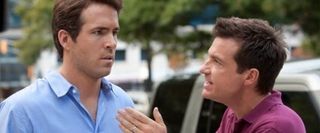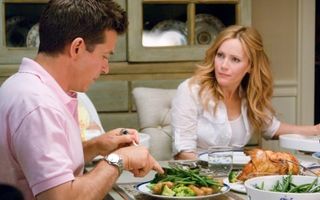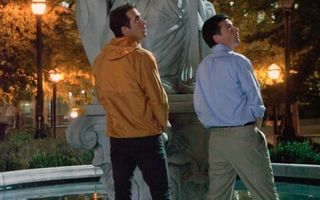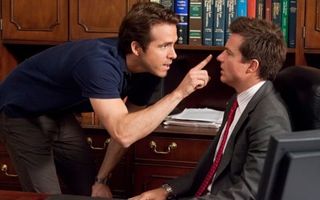Set Visit Report: Ryan Reynolds And Jason Bateman Get Raunchy In The Change-Up

If you find yourself seeing The Change-Up this summer and envying the house occupied by Jason Bateman and Leslie Mann's characters- the big kitchen counters, the lushly carpeted bedroom, the giant cushy couch-- keep in mind that the neighborhood isn't so great. Not only is there a burly grip or sound guy standing just outside pretty much every wall, but there's a dusty prop storage area right next door, and even though we're in Georgia, it's still January, and it's still freezing in there.
Because the house, of course, is just one of the many enormous sets that Universal has built at an old warehouse just west of Atlanta, where The Change-Up had been shooting for nearly three months when I visited the set in early January. The film is actually set in Atlanta, unlike a lot of productions that shoot there, and the production had already visited local landmarks like Turner Field and Piedmont Park-- a good time for them to wrap outdoor shooting, since a giant ice storm set in on the city the day we left the set. And even though this January day would be one of the last the crew spent in Atlanta, stars Jason Bateman, Ryan Reynolds and Leslie Mann were at work on a scene that comes early in the film, in which Reynolds's slacker friend character visits their lovely home and provides some, well, slightly inappropriate advice to their five-year-old daughter.
Just what that advice was varied from take to take. We watched director David Dobkin take Reynolds through dozens of different versions of the short scene, in which the little girl asks "Uncle Mitch" to attend her dance recital and he responds with everything from "Only if it's exotic dance" to "Absolutely not. Now go upstairs and do something with your hair." The young actress was a champ, hitting her cue each time, allowing Reynolds to toss her ludicrously (but safely) high in the air, and even faceplanting perfectly on cue every time he pushed her up the stairs at the end of the scene. Mitch, as you can probably tell, isn't really the most responsible uncle, and like a lot of things in movies by Wedding Crashers director Dobkin, it's a scene that wouldn't be funny in real life but hopefully will wind up hilarious onscreen.

"If you’re doing anything that you hope is worth doing, hopefully you’re making somebody uncomfortable, right?" Dobkin said later when the six of us visitors sat down with him at the big kitchen table on set. And the unexpected discomfort in The Change-Up actually starts with the premise, which takes the classic PG-rated notion of the body-switching comedy-- think Freaky Friday-- and transplants it to the foul-mouthed world of Dobkin and screenwriters Jon Lucas and Scott Moore, who also wrote a little R-rated comedy called The Hangover. Where characters in other body-switching comedies get switched by a magical wizard or toy, Dave (Bateman) and Mitch (Reynolds) switch after a night of drinking that ends with them peeing in a magic fountain. And The Change-Up is like other comedies in the genre, seeing its characters caught in wacky situations, it's probably got more sex and poop jokes than all the others combined.
All of it was on display in the scene we saw them shoot, despite the fact that two twin infants were on hand in their high chairs as Mitch joins Dave and his wife in the kitchen while the boys prepare for their night out. Mitch and Dave are longtime friends who have grown apart in recent years, as Dave spends time with his wife and three young kids while Mitch continues living a raucous bachelor lifestyle. In this scene we see Mitch arrive at the house, flirt shamelessly with Dave's wife (Leslie Mann) right in front of him, and usher Dave off to a night at a Braves baseball game-- a night that ends with them getting drunk, admitting they're each jealous of the other's life, and peeing in that magic fountain. The next morning they wake up in each others' bodies, and all kinds of hell breaks loose from there. In fact, why don't you check out the red-band trailer below as a reminder of just what's in store.
The director, writers and the cast were all wary of letting loose any jokes or gags beyond what you're seeing in the trailer, and understandably so-- comedies, especially raunchy comedies like The Change-Up, always rely on taking you by surprise. So when we talked to Dobkin, Lucas, and then Bateman and Reynolds together in breaks between scenes, we mostly focused on the bigger picture-- what it's like to make an R-rated comedy in this post-Hangover era, how to keep pushing the envelope without making it totally absurd, how to adapt the squeaky-clean PG kind of body-switching story into this raunchy comedy style, and of course, the eternal hilarity of hitting kids.
CINEMABLEND NEWSLETTER
Your Daily Blend of Entertainment News
Tomorrow we'll have our conversation on the set with Bateman and Reynolds, including details about their years-long friendship that led them to team up in the film and what we learned about their characters by snooping around the sets that act as their bedrooms. Today, though, check out what Dobkin and Lucas had to say about deciding to team up on the film, where they see the future of R-rated comedy, and as Lucas puts it, why "if you learn anything in this movie, we’ve failed." The Change-Up hits theaters on August 5.

First things first: this is an R-rated take on a typically PG genre. It's going to be raunchy and kinda gross, and both Lucas and Dobkin want you to know this from the start.
Lucas: It will hopefully offend everyone here. To take a movie like that that’s generally been done –really well –but in a Disney, teen type thing and take that and put it in a really unhealthy world of R-rated comedy -- that was the whole pitch. It's harder to shock people [these days], for sure. There are very few things out there that make people go 'whoa!' There ARE a few, thank God. And they're all in this movie!
Dobkin: Look, you’re going to know what it is. It’s a body-switching movie and [Reynolds's character Mitch] is a child that gets thrown into a domestic situation. What you’ve just seen there, just imagine that guy getting inside your body and running your life. Like that’s the fun of it, is that he completely doesn’t understand children or relationships or how to have a daughter or anything like that, so that inherently becomes part of his journey and what he learns is not on that path.
Lucas: You'll see today, we don’t take anything super seriously, The second you get super precious with the genre is to turn it around. But you do need heart in the movie--you can’t do jokes for two straight hours. The fear is – and this is always an instinct that happens in development – but there’s always a fear that these movies become a little more dramatic, like, "What’s he really learning?" We want everyone to learn a little lesson, but no one goes to an R-rated comedy to learn how to live their life better. You go to get away from your life for two hours and have a great time. So if you learn anything in this movie, we’ve failed.
After they had such a huge success with The Hangover, Lucas and his writing partner Scott Moore felt pretty comfortable writing R-rated comedies, and started pitching ideas at each other based on their own lives.
Lucas: We have these dinners, once a month or so, a bunch of guys go to dinner and have steak and talk about stuff. At first it was me and another guy who were the two married guys, and all the single guys would laugh at us – I got married young, but we’ve won a few over to our camp. The conversations we’d have – it’s like the people they pull out of the jungle who don’t understand how electricity works. I’m asking questions that are so dumb about being single like, “What do you say, how do you do it? That sounds so crazy!” and they’re like, “You’re married, do you have sex like once a day? Or twice a day?” and I’m like “Are you out of your fucking mind?”
Some of that stuff got into the script. And that’s some of the funniest stuff. There’s a scene in the movie where [after the body switch] Jason’s like, if I’m gonna impersonate you, how many times do I have to have sex with your wife? And Ryan’s like, it’s Tuesday. And Jason’s like, I don’t understand, you don’t have sex on Tuesdays? And Ryan’s like No! We never have sex on Tuesdays. You’re completely safe on a Tuesday, it’s not even gonna come up.
Dobkin: When I first heard the idea, and it was “a single guy and a married guy switch bodies,” I was like, “That’s really kind of clever actually,” and I tried to wrack my brain and I was like, “I definitely haven’t seen it.” But it was a fun way to address men and how fucking weird men are about stuff, and I was like, “Okay, this is kind of cool." It’s the R-rated point of view of it so it’s got a punk rock thing to it that I really dig.
This is an amazing screenplay. You move through it so quickly and you laughed out loud so much, it was a little bit shocking. It was actually a challenging piece of material because once you got in, the actors had to ground it, as far as making it believable. You realize how much sleight of hand these guys succeeded at. You’re like, “How much of that are we going to get away with when we shoot it and how much do we actually have to fill in the blanks and justify it?” I’m with it cause I’m laughing and almost anything you laugh through you’ll accept, but it’s quite a tightrope and it’s been really interesting.
Lucas and Moore had done a little bit of rewrite work on Wedding Crashers, which was one of the reasons they sought out Dobkin to direct The Change-Up. Lucas told us about the one joke of theirs that made it into the film-- "And it was Scott’s too, which sucks."
Lucas: Remember the dinner scene? There’s a joke about the families getting together… and Owen makes a joke about the Klingon Revolution. It’s a Klingon joke. Like, our only joke is a Star Trek joke? I feel filthy about it.
So we met David that way, and we all had three-year-old kids. And he read the script and he’s like, I get it. The opening scene is about waking up in the middle of the night and feeding your kid and there’s a lot of stuff about parenting young children. So I think he was a perfect choice, because I think you have to know a little bit about how ferociously tough it is in the first year or two to raise kids to get the movie.
Dobkin: I always look for ideas that are really far out there but I’m always trying to tell a story through the characters, and if you keep them grounded and you’re really actually following through the story in a dramatic sense. In Wedding Crashers for example, there are two stories that are happening in it--one is about a friendship that’s about to splinter because one of them is growing out of something that the other hasn’t yet, and the other is a love story that Owen has with Rachel and he’s kind of growing up. When you’re following the characters very carefully through the scenes, it really informs all the comedy and everything else and I think that’s where the tone comes from. You put them in some absurd situations, but they’re always challenging them on some sort of character level.

Everyone was very honest about the fact that there were a lot of different permutations of actors who could have take on the script before Reynolds and Bateman came on board. See if you can imagine the various different versions of the movie they're each alluding to having been possible at some point.
Dobkin: I’m always looking when I cast people to do something that I think they haven’t done. I felt what Ryan’s doing here I have not really seen him do, and what he does on the other side [when switching bodies with Bateman] is brilliant as well. And same for Jason Bateman, by the way. Jason ends up being that guy for most of the movie which is really kind of awesome and freaky and weird. They’re not imitating each other in the movie. We’re not interested. I mean, they piss in the fountain so how fucking serious do you think we’re taking the body switching?
With casting, there was a very short list that the studio. I was very lucky. The writers brought me the screenplay, I loved it, we took it to studios, Universal understood it. It’s my first picture with them. There was a very short list, there was a budget number, and if you could get someone off this list and you can hit that budget, you have a greenlight. We’re in a very strong position and Ryan and Jason were on that original list and they both said “Yes” so we were off to the races.
Lucas: We've worked on movies where the casting has definitely upped it, and we've worked on movies where casting has hurt us. It's easy to blame the cast, because it's everyone's fault [when something doesn't work.] But casting is "who's available, who can we afford, who's interested?" The list gets pretty small when you're down to who wants to do your movie. I think these two guys are awesome. The worst thing is, I would probably tell you that anyway, even if I hated them, because I'd never tell you I hated them, and it sucks because I lie all the time and now I'm actually telling the truth.
I don't know what you guys think of them, but... they're still fresh. The Hangover had this thing where it could have been Will Ferrell, Vince Vaughn and Steve Carell. Or it could have been three guys you didn't know that well. And part of its success, I think, came from the fact that you didn't quite know who they were, and these guys might kill a hobo in this movie. Will Ferrell is never going to kill a hobo. He's a great guy, but he's got another movie to do after this one, and he'll never go that far. I think this movie benefits from that. We know Jason and Ryan, but I'm not sure I've seen them do hard-R. I think that's part of the appeal. I think audiences get a little tired of the big comedy movie stars. It can start to be a negative. I think audiences, especially for comedy, don't mind a guy who hasn't been in every prior comedy. Anyway, long answer, but they've done great, they're awesome in this. They're really friends, and it is really hard to manufacture that, it's like a romantic comedy where you can tell they hate each other. And this is great because it's hard R, and Jason Bateman doesn't get the call very often to do dirty material. He's always the nice dad who's struggling a little bit. And he gets to do that in the first third of this movie, and then he's just an animal. I think that was the appeal for him.

The body-switching gag requires that Bateman and Reynolds both set up their established characters-- Bateman as the frazzled dad, Reynolds as the hard-living bachelor--and then each of them become the other. Both Dobkin and Lucas really saw the two actors stretching themselves in both roles.
Dobkin: With Jason, you can see him play the married guy but also the guy with the sarcastic, sardonic wit. With Ryan, you know what I loved him in? Adventureland. He was fucking awesome in that movie and you could not tell if you were worried about him or if...he played that right in the middle. And he has so much warmth and so much charm that going into something like this with him...because I always want the characters to be lovable. I don't know how to follow characters that aren't flawed and making mistakes. So you gotta pick guys you're already going to believe in.
Lucas: [Reynolds is] a goldmine. It's kind of frustrating when someone is cool, good-looking, hard-working and really funny. Could you just not have been funny? Leave me something! It was jogging in the gym this morning, and I looked over, he's working out. If you ever want to feel horrible about yourself, work out next to that dude. I'm just going to go back to my room and eat donuts. But he's great. And the improv thing is really dangerous, because you've got to stick to a schedule, but every day he comes in with five funny lines, and he sticks with them, tries them out in different ways, or you can throw him something in the middle of a scene and he'll just work it in.

Even on the set six months before The Hangover Part II set a massive box office records for R-rated comedies, the original film was still a big part of the conversation, and not only because Lucas and Scott Moore had written the script for that. Lucas reflected on what he learned about the genre from writing the script for The Hangover, while Dobkin talked about seeing the current success of R-rated comedy as an invitation to push the envelope even further.
Lucas: I think Todd Phillips did an awesome job [with The Hangover]. Not everyone can direct those kinds of movies. It’s a very specific skill to direct a movie like that, to keep it from going so silly, too dark, too mean. When we were writing Hangover, it was bachelor party in Vegas, and -- just like body-switching movie -- you were probably like “Really, another dumb-guys-go-to-Vegas movie?” So we’re trying to find new ways into old stories. Audiences -- particularly young people -- now are smarter and have other options. If you don’t put something new out there, you’re kinda dead. So I think it’s great to be totally honest that we have to work harder to get people to go. Hopefully it will make movies be a little bit better.
Dobkin: Going in and doing R-rated comedy, especially now that so many movies are succeeding at such a high level with it, if you’re not trying things and pushing things, I don’t think you’re in a place where people are going to laugh with it. I think that’s really an important part of the dialogue that’s going on among the filmmakers, the actors and the writers that do this kind of thing. Obviously, this studio is really letting us run with it and they’re very supportive, but I’m always surprised that no matter how it’s worked, I think they still look at it as a fluke. I think there’s something within the system that they just fucking don’t believe it, and as you get close to production most of the time, they’re all starting to question and backpedal and you feel like you’re in the 1950s. It gets a little bit mind-numbing at times and it’s a real drag unfortunately Ultimately if you’re doing anything that you hope is worth doing, hopefully you’re making somebody uncomfortable, right?
Check back tomorrow for more from The Change-Up set, including our interview with Bateman and Reynolds. The Change-Up hits theaters on August 5.
Staff Writer at CinemaBlend
Most Popular







